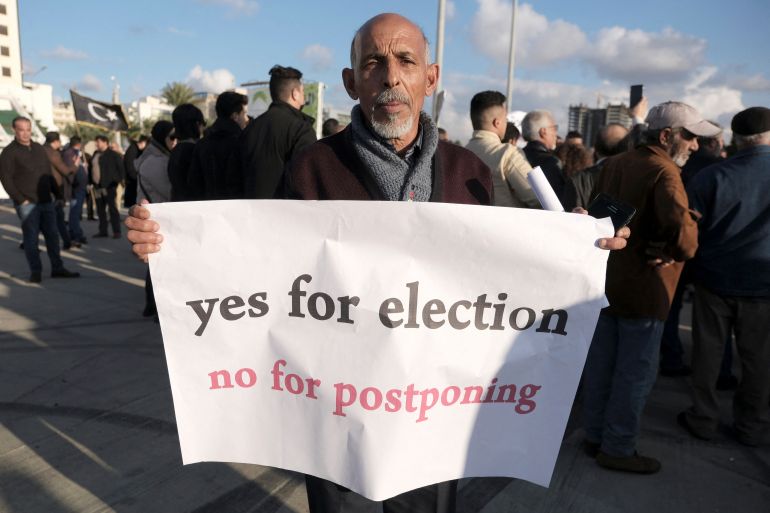Western powers urge Libya to set new election date ‘swiftly’
The UK, France, Germany, Italy and the US call on Libya to set a new date for a delayed presidential vote quickly.

The United Kingdom, France, Germany, Italy and the United States have urged war-torn Libya to set a new date for delayed presidential election quickly.
“We call on the relevant Libyan authorities to respect the aspirations of the Libyan people for prompt elections by swiftly determining a final date for the polling and issuing the final list of presidential candidates without delay,” a joint statement from the five nations said on Friday.
Keep reading
list of 4 itemsWhy Libya’s election got postponed: A quick guide
Libya electoral board suggests January 24 for polls
Has the political process in Libya failed?
The authorities overseeing Libya’s first presidential election said earlier this week holding it on Friday as scheduled would be “impossible”.
The vote was intended to mark a fresh start for the oil-rich North African country, a year after a landmark ceasefire and more than 10 years after its 2011 revolt that overthrew and killed longtime leader Muammar Gaddafi.
But speculation of a delay had been mounting for weeks. There were bitter disputes over the vote’s legal basis, the powers of the winner and the candidacies of several deeply divisive figures.
On Wednesday, the chairman of the parliamentary committee overseeing the vote wrote to the assembly’s speaker saying that “after consulting the technical, judicial and security reports, we inform you of the impossibility of holding the elections on the date of December 24, 2021”.
It did not propose an alternative to Friday, a date set last year during the United Nations-led peace talks in Tunis.
The country’s electoral commission, the HNEC, later on Wednesday suggested delaying the vote to January 24.
Libya’s parliament is to meet on Monday to debate a new timeline for elections.
The election, intended to go hand-in-hand with parliamentary polls, was part of a UN-led peace process, yet UN special envoy Jan Kubis resigned just weeks before the ballot.
One point of contention was a presidential election law controversially passed by speaker Aguila Saleh, which critics say bypassed due process and favoured a run by his ally, renegade military commander Khalifa Haftar.
Another candidate is Gaddafi’s son Saif al-Islam – a divisive symbol of the old regime wanted by the International Criminal Court (ICC) over war crimes allegations.
Libya’s parliament said in September it would not recognise the interim Government of National Unity (GNU) beyond December 24, but the statement by France, Germany, Italy, Britain and the US said it should stay in place.
The statement pointed to agreements at an international meeting last month to say power would not be transferred until after the results of the elections were announced.
The British embassy later said on Twitter that it continued to recognise the GNU and would not endorse any attempt to set up a breakaway government.
Public anger
Libyans voiced anger at the delay.
In Benghazi, Wahbi Tarkhan, 81, said he and his wife had both registered for the election and were disappointed by the collapse of the process.
“We were eagerly waiting for this day in our minds,” he said.
UN special adviser Stephanie Williams said on Thursday that during meetings across Libya she had consistently heard people voicing a desire for elections.
“I call upon the concerned institutions to honour and support the will of the 2.8 million Libyans who registered to vote,” she said.
Any fresh effort to resume the electoral process will have to weigh the dangers inherent in a delay against the risks of again attempting an election without consensus on the rules.
Libya’s last election in 2014 was the trigger for rival eastern and western factions to split apart into warring parallel administrations.
Musa al-Sulaimani, who has registered to stand for the parliamentary election, said he felt very frustrated by the delay.
“This was something the Libyan street resented,” he said.